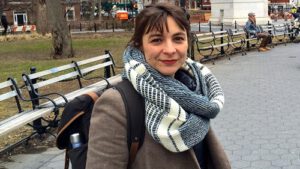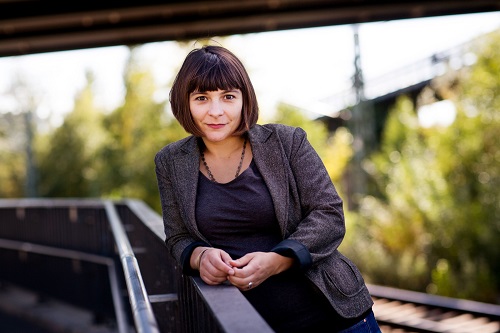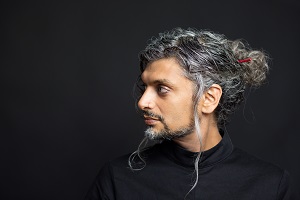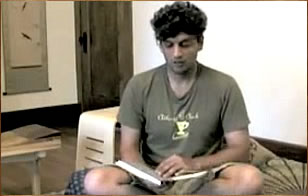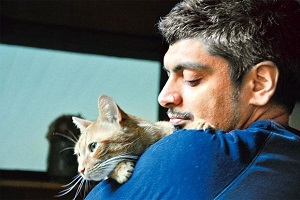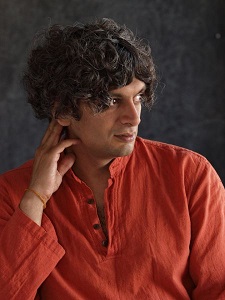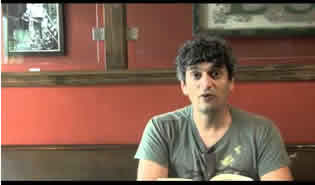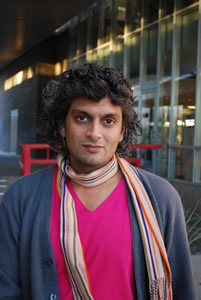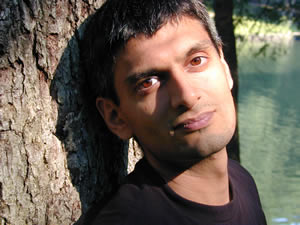De Nederlands schrijfster en historica Annejet van der Zijl werd geboren in Leeuwarden op 6 april 1962. Zie ook alle tags voor Annejet van der Zijl op dit blog.
Uit; Anna. Het leven van Annie M.G. Schmidt
“… ik moet een jaar of drie geweest zijn toen mijn moeder riep: ‘Gauw, gauw, kom kijken, paardenvolk!’ Eerste Wereldoorlog. Mobilisatie. Ons dorp was vol uniformen. Er was niets angstaanjagends aan. Integendeel, het had iets vrolijks en ik begreep uit mijn vaders uitleg dat we niet bang hoefden te zijn. Oorlog bestond alleen in hele verre landen, zoals België, niet bij ons.
Terwijl op nauwelijks honderd kilometer afstand hele generaties jonge mannen in de loopgraven van Ieper en Verdun werden uitgeroeid, hernam het dagelijks leven in het Zeeuwse dorp al snel zijn vertrouwde gang. De vluchtelingen verdwenen naar andere provincies of terug naar België, de militairen werden een vertrouwd deel van het straatbeeld. Ter gelegenheid van haar vijfde verjaardag kreeg Annie door het raam van de salon een cadeautje aangereikt van een in Kapelle gelegerde majoor, die kennelijk vriendschap had gesloten met haar moeder.
Uit het pakje kwam een poppenbadje. Er bestond nog geen plastic, het was van celluloid. Er zat een klein bloot celluloid poppetje in. Het kraantje kon echt lopen als je water deed in het tankje bovenin.
Nooit in m’n verdere leven heb ik zo’n verrukkelijk cadeau gehad.
Het paard brieste en stampte, de majoor lachte vrolijk. Geuren van meibloesem woeien naar binnen en de zon scheen op ons alle drie. Alle vier eigenlijk, als je het paard meerekent.
De zon? Onzin. De salon lag pal op het noorden; er kwam nooit een straaltje zon naar binnen. Er moet iets anders geweest zijn waardoor de wereld van goud leek.
Haar eerste jeugdjaren bracht Annie in grote geborgenheid door. Truida Schmidt concentreerde al haar liefde, aandacht en zorg op het dochtertje dat ze op de valreep nog gekregen had. ‘Ik zou je ’t liefste in een doosje willen doen’, zoals ze zei. ‘Als een dikke spinnende moederpoes’ die alles wegblaast, dribbelde ze om Annie heen. ‘Ik was een kostbaar kleinood dat bewaakt en afgeschermd moest worden.’ Urenlang zat ze haar voor te lezen en liedjes met haar te zingen, en al snel was het kind zelf in staat Ot en Sien te spellen. Op vierjarige leeftijd zou ze zelfs haar eerste gedichtje gemaakt hebben:
Er was eens een hond,
die zat op z’n kont
er was eens een kat
die zat op z’n gat.
Dat haar vader iets bijzonders was binnen het dorp, besefte Annie al vroeg. ‘Hij was de baas van de kerk. En de kerk met z’n hoge toren was het middelpunt van het heelal. Elke middag om twaalf uur luidde de koster eigenhandig de torenklok.”
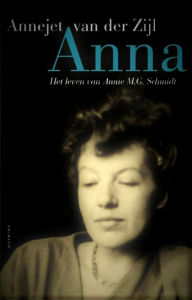
Annejet van der Zijl (Leeuwarden, 6 april 1962)
Cover
De Amerikaanse dichter, schrijver en essayist Kazim Ali werd geboren op 6 april 1971 in Croydon, Engeland. Zie ook alle tags voor Kazim Ali op dit blog.
The Earthquake Days
In the earthquake days I could not hear you over the din or it might have been
the dinner bell but that’s odd
because I’m usually the one
cooking if not dinner then
a plan to build new fault lines through the dangerous valley.
I can’t give you an answer right now because I’m late for my
resurrection,
the one where I step into my angel offices and fuck
the sun senseless.
That eclipse last week? Because of me.
You’re welcome.
The postman rattles up with your counter offer and I’m off
to a yoga class avoiding your call yes like the plague
because son you can read
in the dark and I have no
hiding place left.
You know me too well and you know it.
We walk hand in hand down the hill
into the Castro
avoiding the nudist protest not because we are afraid but
because we already know all about this city, its engineered
foundations,
the earthquake-proofed buildings, the sea walls.
No tempest will catch us unaware
while we claim our share of
the province of penumbral affections.
You have no reason
to trust me but I swear I lie
down in this metal box as it thunders and looks
inside my brain. I am terrified nothing
is wrong because otherwise
how will I rewrite the maps unmoored
a deep sea a moor a cosmonaut
Who needs saving more
than the one who forgot
how the lazy cartographer mislabeled
his birthplace as Loss?
Riding the bus out to the end of the lines and back
I collect trash for art, oil spill, spent forest, the mind
is at work and everything is at stake. I demand
statehood for my states of mind, senators
for my failure, my disappointment, the slander
and my brain unmapped reveals no
explanation for danger the ground untamed.
I make paintings of nothing and
stand before them like mirrors.
I recently became a man but I do
not want to let go of my weakness,
instead want to meet God in heaven and in long psychotropic odes
have Him send me again digging in the dirt to unleash
tantric animal governors to lay down
the orgasmic law twice skewered and miserable
in the old photographs, miserable in my body, huddled
next to my mother, recently permed and aglow so unaware
of what is about to hit her. I am the answer to Bhanu’s question:
“Who is responsible for the suffering of your mother?” and so sick
I considered that sickness
could bring us closer and Shahid and Allen in heaven
slap me silly because they want me to know that
this world is worth its
trembling. At the next table over a mother
tries to reconcile her bickering sons. I have
no brother but the one
I invent has always got my back, he drowns
out the mullahs so my mother can
hear me finally. In a different book Jesus
never suffered, never was flogged or died
went whole into heaven without passion.
Shall I then deny myself passport through the stark places
unsalvageable, imagine it, the Mother
of Sorrows did never grieve in the new season
trees smell of semen and the tectonic plates
make their latest explosive move:
to transubstantiate my claim
by unveiling this city down to its stone.
Everyone I know wants to douse
the hungry flames, flee the endless aftershocks,
unravel every vexing question.
You owe me this witness.
I owe you the fire.
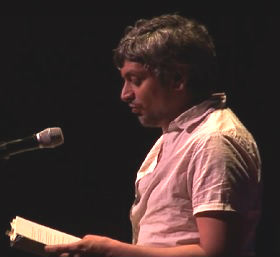
Kazim Ali (Croydon, 6 april 1971)
De Duitse dichteres Uljana Wolf werd geboren op 6 april 1979 in Berlijn. Zie ook alle tags Uljana Wolf op dit blog.
dust bunnies
wir wollten über kleine tiere sprechen, wollten auf die knie gehen für die kleinen tiere, jene aus staub und schlieren, in ritzen und dielen, jene, die in grauen, feilen frieren, unsere tiere aus nichts, wir wollten auch ganz nah in deiner spräche und in meiner hauchen, sag mir liebes, hast du heute schon gesaugt, nein, wir wollten unsere tiere nicht erschrecken, klein wie flecken, sind das flecken, haben sie nicht puschelscbwänze, lange löffel, oder lange schwänze, tuschelohren, wollten wir nicht weniger rauchen, weniger husten, weniger entweder oder sein, gestern war die zimmerecke einsam in ihrer knarzenden öde. heute ist sie hort, heute zärtlichen horden ein port, wir wollen also still sein, auf den knien lauschen: unsere kleinen tiere, wie sie ihre wollenen, mondgrauen namen tauschen.
bougainville
0
gestippelde ochtend hoe die vanonder de mist
opstijgt alsof ’t door vloeiblad heen weekt
waterverven, val van bladpunten, val van tuiten
als van tule, een twijgje schilt zich uit het kostuum
heeft geen lijf, rekt zich, bezint zich op (groen) en
de zenuwpunten in de schouder van het dal groeten
het bewegen, de arm, ze leggen de hand op tafel
bij de knoppen, bloesems, de niet te vatten lucht –
1
ontbreken de steunbladeren ontbreekt de bevattelijke
grond om je heen en is zo één verhouten complot
een plaats delict van beschrijving: vliezig, geribd, zo
is vaak de griffel bezet met papillen, snap dat, zonder
een kijken naar, blootgesteld enkel aan het op elkaar
botsen van vocalen tussen haren, doorns, kan dat vergroeien
laat zich dat binnenhalen, gerafelde zoom fluweel soms
lancetachtige bladschijf, kopieer dat, tweeslachtige signalen –
Vertaald door Annelie David
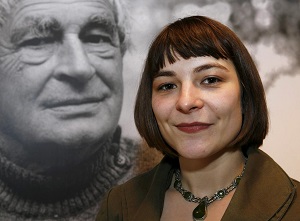
Uljana Wolf (Berlijn, 6 april 1979)
De Roemeense schrijver, journalist en literair criticus Iulian Ciocan werd geboren op 6 april 1968 in Chisinau, in de toenmalige Sovjet Socialistische Republiek Moldavië. Zie ook alle tags voor Iulian Ciocan op dit blog.
Uit: The Queen of Hearts (Vertaald door Alistair Ian Blyth)
“Sergeant Jora Kureki was summoned to the Telecentru Sector Police Station to be entrusted with a new mission: he was to patrol the danger zone around the huge pit day and night. Captain Putinelu, with his permanently puffy face, affectionately put his arm around Kureki’s shoulders, trying to mollify his disgruntlement.
“It’s an order from the top, Jora . . . we haven’t got any choice . . . you’ll stroll around that damned pit, you’ll warn people out walking late not to get too close to the edge, you’ll shoo away drunkards, so that they won’t tumble into the chasm. You’ll even be able to take quick naps on a bench. It’s summer, it’s warm, it’s pleasant to be out at night, Jora!”
Captain Putinelu gave an understated smile and studied Kureki closely with his eyes.
“Yes . . . but, why do I have to go and walk around in the middle of the night, boss?” grumbled Jora Kureki. “I’m busy with the case of the dustbin that went missing from the yard of the Prosecutor’s Office —”
“I told you the order came from the top, Jora. And in that order, it says quite clearly that the policeman assigned to patrol the danger zone is sergeant Kureki. Or maybe you’d like me forget about the whole thing and find a replacement for you?”
Captain Putinelu cast his dissatisfied subaltern a reproving look.
“Yes, but . . . how many nights am I going to have to hang around the pit?”
“I’ve got no idea, Jora! As long as it takes. In other words, for as long as there’s a pit.”
“But it’s a bit big, boss . . . who knows how long it’ll be there. What are we supposed to do? Walk around the pit like lunatics for months or even years?”
“You’ve started to talk out of turn, lately, Jora. Do what you’re told and be thankful that you’ll be getting overtime! Now, get out of here, because I don’t have time to listen to your moaning,” said the captain with the permanently puffy face, raising his voice.”
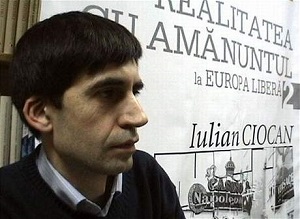
Iulian Ciocan (Chisinau, 6 april 1968)
De Duitse schrijver en dichter Günter Herburger werd geboren op 6 april 1932 in Isny im Allgäu. Zie ook alle tags Günther Herburger op dit blog.
Uit: Das Glück: Eine Reise in Nähe und Ferne. Photonovelle
„Der nächste Winter Frühmorgens, die Kälte sickerte in die Poren, sahen Wege aus wie Pfeile, die sich irgendwo verloren. Milchtanker, denen ich begegnete, fuhren hart am Rand und scheuchten in den Schnee. Als ein Astronaut landen wollte, rief er in sein Mikrophon oder Belebungsgerät, die Ebene kenne er schon! Es war eine Enklave zwischen dem Weiler Neutrauchburg und den Menelzhofener Höhen im Allgäu. Meine beiden Großmütter – die eine trug Ringe aus abgeschnittenen Stielen silberner Teelöffel, die andere war Erbauerin begehbarer Schränke – flüsterten aus dem Gezweig: Ras Alhague und Ras Alghet. Ich schlug im Sternenatlas nach und fand Nachbarschaften wie Regulus und Krebs, Bellatrix und Beteigeuze, verbunden durch Entfernungen, die wir nicht begreifen. Im vormaligen Pulverturm arbeitet noch ein Töpfer, dessen Haare schwinden. Er lädt zu Kursen ein, und wenn die Teilnehmer, es sind meist Frauen, laut werden, zeichnet er mit Kreide eine Höhle auf die Tafel, die Dschebel Kafzeh heiße, ein Fundort bei Nazareth für menschliche Skelette aus der Riß-Würm-Warmzeit. Weit weg in der Kälte wurde ein Gehäuse aus Eisenblech, das früher einen Wasserfall mit einer Flachsspinnerei verband, aufgerichtet. Das hohle Monstrum scheint, je näher wir kommen, zu wachsen. Wo ich geboren wurde, werde ich wieder sein. Es gibt noch enge Gassen, alle Mauern sind alterslos getüncht, doch dahinter gewinnen träumerische Gesänge an Macht. Draußen hat sich wieder Kälte ausgebreitet, so daß die Säume der Wälder Jackenfutter gleichen. Füchse, die vorbeikommen, stellen ihren Schwanz hoch und schnaufen verächtlich. Aas, das am Weg liegt, ist kaum mehr zu riechen. Kettensägen und Schaufelbagger sind vorrätig im Wald, der, solang er noch steht, Wind und Frost in sich behält. Wer seine Handschuhe auszieht, wird daran erinnert.”
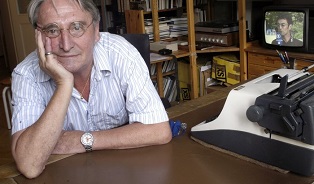
Günter Herburger (6 april 1932 – 3 mei 2018)
De Deense schrijver en journalist Jakob Ejersbo werd geboren in Rødovre op 6 april 1968. Zie ook alle tags voor Jakob Ejersbo op dit blog.
Uit: Liberty (Vertaald door Ulrich Sonnenberg)
„Vor drei Monaten begann Vater als Chef der Buchhaltung einer Zuckerplantage, die TPC heißt – Tanzania Planting Corporation. Sie gehörte der Reederei Mærsk, wurde aber von der tansanischen Regierung verstaatlicht. Doch für die nächsten Jahre hat Mærsk noch einen Vertrag und soll den Eingeborenen beibringen, die Plantage zu betreiben. Sie liegt ein Stück südlich der Stadt Moshi, in der auch die Schule ist. Vater dreht sich auf dem Vordersitz um. »Bist du okay, Christian?« »Wann fahren wir zu unserem Haus?«, möchte ich wissen. »Später«, sagt Vater. »Es ist erst sieben.« Er hat mir erzählt, dass die Dunkelheit am Äquator früh und sehr plötzlich kommt. Mein Kopf fühlt sich leicht an. Ich könnte töten für eine Zigarette. »Okay«, sage ich und schaue aus dem Fenster, der Himmel ist mit klaren Sternen übersät, die sich bis zum Horizont erstrecken. Wir erreichen eine T-Kreuzung, an der Holzschuppen und kleine gemauerte Häuser ein schwaches Licht in die Dunkelheit werfen. Es sind Läden auf bloßem Erdboden. Dunkle Gestalten bewegen sich zwischen ihnen. Wir biegen rechts ab in Richtung Moshi. »Dies ist eine der besten Straßen des Landes«, erklärt mir mein V ater. »Fast keine Schlaglöcher.« Die Dunkelheit hüllt uns völlig ein. Es gibt so gut wie keinen Verkehr, und Katriina fährt schnell. Die Straße beginnt, kurviger zu werden, und führt bergab in eine Schlucht – die vorderen Scheinwerfer erleuchten steile Felswände auf beiden Seiten. »Was ist das denn!?«, stößt Katriina aus und tritt die Bremse durch, gleichzeitig reißt sie das Lenkrad herum, um einem großen belaubten Ast auszuweichen, der auf unserer Seite der Straße liegt. Die Bremsen blockieren, der Wagen rutscht auf den Ast und schiebt ihn vor sich her, bis wir zum Stehen kommen.
»Dort hält jemand«, sagt Vater. Ein Stück weiter vorn kann ich undeutlich einen dunklen Kasten erkennen, die Scheinwerfer liefern nur ein diffuses Licht durch das Laub des Asts. »Straßenräuber?«, fragt Katriina. »Glaub ich nicht«, erwidert Vater und öffnet die Tür. »Der Ast ist ein tansanisches Warndreieck.« Ich steige ebenfalls aus und helfe ihm, den Ast von der Frontpartie des Wagens zu ziehen, während K atriina zurücksetzt. Wie ich jetzt erkennen kann, handelt es sich bei dem Kasten um einen Lastwagen, der an eine der Felswände geprallt ist und quer auf der Fahrbahn steht – ein großer frischer Zweig steckt an der hinteren Stoßstange. Wir schleppen den Ast wieder an seinen Platz auf der Fahrbahn. Bei dem verunglückten Lastwagen sehe ich niemanden mehr.“
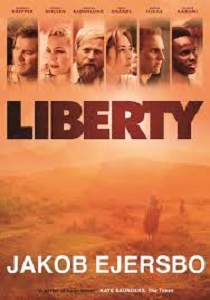
Jakob Ejersbo (6 april 1968 – 10 juli 2008)
Cover
De Nigeriaanse dichter en schrijver John Pepper Clark werd geboren op 6 april 1935 in Kiagbodo, Nigeria. Zie ook alle tags John Pepper Clark op dit blog.
Uit: Song Of A Goat
“ZIFA: …You
Said I should make sacrifice to the gods.
These past several years we have none of us
Followed your word. Being the elder,
I agree, I am to blame for this.
But now I obey you and will make instant
Sacrifice to the gods.
ORUKORERE: But you are
As yet not cleansed, and for that matter all
The concession is reeking with rot and
Corruption.
ZiIFA: In that case, it needs drastic
Cleansing, which is what we shall now all perform.
ORUKORERE: Be careful, son, and do nothing that is
Rash. When the gods ask for blood it is
Foolish to offer them oil.
(…)
ORUKORERE: Take away The light.
Will you take away your lamp?
What, am I become so like a statue
That discovered among ruins in
The sun-set day, you wonder at
Yet will not bow down to? I know
I have lost both my face and limbs.
Recognition therefore’s become a thing
For houseflies and bats, has it? I say
Let there be no light again in this house.”
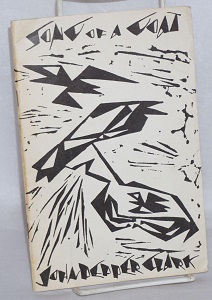
John Pepper Clark (Kiagbodo, 6 april 1935)
Cover
De Oostenrijkse schrijfster Brigitte Schwaiger werd geboren op 6 april 1949 in Freistadt. Zie ook alle tags voor Brigitte Schwaiger op dit blog.
Uit: Lange Abwesenheit
„Und wie überlegen du mir jetzt schon wieder bist. Aber ich glaube nicht, dass du dich hast aufnehmen lassen in die große Gemeinschaft der Heiligen. Du sitzt irgendwo allein und verfluchst Mutter, weil sie dir nicht die Wärmflasche bringt. Du willst nicht zusammen mit den gewöhnlichen Toten rund um den Herrgott sitzen. Wenn es einen Herrgott gibt, sagtest du einmal, dann soll er die Krankheiten abschaffen! Der Herrgott sollte dir lieber eine Wärmflasche geben, Kamillentee und Schafwollsocken. Und eine Zeitung. Aber hab Geduld, wir kommen ja nach. Großmutter ist schon recht alt. Und wir sind auch sterblich. Dann bringen wir dir Zigaretten und lassen uns wieder von dir erzählen, wie du geritten bist am norwegischen Eismeer, was für dicke Lachse du gefischt hast, und wir bewundern dich. Und wenn Mutter und die Schwestern schlafen gegangen sind, bleibe ich in der Küche sitzen und frage dich, ob du dich erinnerst an das weiße Kleid, wie ich im weißen Kleid zu dir gekommen bin, wie du das sagtest von der kleinen Geliebten, wie eine kleine Geliebte, wie eine heimliche Geliebte, und du antwortest: Ja, ja. Dann gehst auch du schlafen, und ich sitze allein in der Küche, trinke den Bierrest aus deinem Glas, werfe deine Zigarettenstummel weg, schaue nach, von wem die Ansichtskarten sind, die an der Holzleiste hinter deinem Essplatz stecken. Patienten, die auf ihren Urlaubsreisen an dich dachten, Sportfliegerfreunde, Kriegskameraden, lauter Menschen, die einen besseren Weg zu dir wussten als ich. Meine Briefe hast du nie beantwortet. Wer war ich denn. Nur eine von den vier Töchtern, die dir das Leben vergällten. Gute Nacht, sage ich. Gute Nacht, sagst du in dem Ton, der zugleich ein lautes Seufzen ist, ein Vorwurf von dir an dich selbst, uns gezeugt zu haben. Du tatest mir oft leid, wenn ich uns so anschaute. Aber auch wir haben uns dich und Mutter nicht ausgesucht. Ich hasse mich selbst, wie ich jetzt kerzengerade stehe vor einem Fleck Erde, unter dem du wahrscheinlich kerzengerade liegst. Jeder an seinem vorläufigen Platz. Ein rechter Winkel zwischen dir und mir. Ich bin gekommen, um Andacht zu halten. Aber du sagst nichts, und ich spüre nur mein Lebendigsein. Papa, lieber. Wir haben ein Papier bedrucken lassen mit deinem Namen und deinem Bild. Sympathisch bist du da, blickst ernst und pflichtbewusst. Der gute Arzt. Ich trage dich in meiner Handtasche herum. So ein Vater, den man auseinanderfalten und herzeigen kann.“
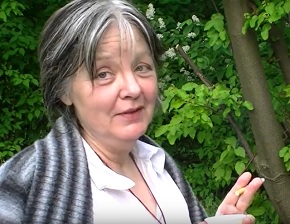
Brigitte Schwaiger (6 april 1949 – 26 juli 2010)
De Franse schrijver, dramaturg en dichter Julien Torma werd geboren in Cambrai op 6 april 1902. Zie ook alle tags voor Julien Torma op dit blog.
Antiques
Olympie, ô l’impie,
je rêve aux rives
de la saine Seine
Qui vive ?
Il y a des pies
à Olympie.
Les pies prient
les aines saines
loin des arbres
Les impies expient
le bris des débris
dans les abris des marbres
Au bruit des bris
les pies pépient et fuient
dans les arbres
Les rives des aines
rivent leurs plis
sans haine.
Le devoir des victimes
La toile cirée se lève
Sur L’Acte Zéro du Drame
Condamnés à mort, pelotez les guillotines en soutien-gorge
Dressées sur des soucoupes !
François-Donatiens, raffinez le suc des crèmes fouettées
Dans les châteaux mollets de la Rostopchine !
L’exécution capitule
Éclairant sa dent creuse d’un mégot à vif
Le cœur coincé entre l’omoplate et la glande pinéale
A travers les socs morts
Et les escouffes de la barbe d’Adam
Sous les coups de feu de la sentinelle
(très vite) Le loulou loue l’août lourd.
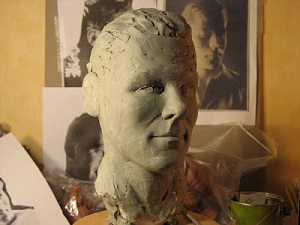
Julien Torma (6 april 1902 – 17 februari 1933)
Zie voor nog meer schrijvers van de 6e april ook mijn vorige blog van vandaag.
